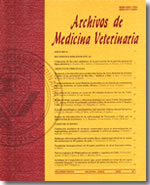Faecal culturable microbiota, growth and clinical parameters of calves supplemented with lactic acid bacteria and lactose prior and during experimental infection with Salmonella Dublin DSPV 595T
Main Article Content
Abstract
The aim of this study was to evaluate the probiotic inoculum + lactose effect on weight, intestinal culturable microbiota, morbidity and mortality of young calves challenged with Salmonella Dublin DSPV 595T. Twenty eight calves were used, divided in control group (CG) and probiotic group (PG). The PG was provided with 100 g lactose.calf-1.d-1 and 1010 CFU.calf-1.d-1 of each strain of a probiotic inoculum composed of Lactobacillus casei DSPV 318T, Lactobacillus salivarius DSPV 315T and Pediococcus acidilactici DSPV 006T throughout the experiment. The pathogen was administered on day 11 of the experiment, at an oral dose of 109 CFU.calf-1. Lactobacillus and yeast populations were modified in PG because of inoculum + lactose administration. Severity of diarrhea was lower in PG. No differences were found on the rest of clinical sings, live weight and mortality between the two groups analysed. The periodic administration of a probiotic inoculum of bovine origin and lactose, favoured the establishment of a more stable and balanced intestinal culturable microbiota, even during an infection with Salmonella. The generated model of acute infection gave opportunity to the probiotic to exert its beneficial effect on severity of diarrhea. However, the use of lower doses of S. Dublin DSPV 595T are recommended for future studies, to generate less severe model in order to evaluate if the inoculum is able to exert a differential response in the clinical symptoms of young calves.

